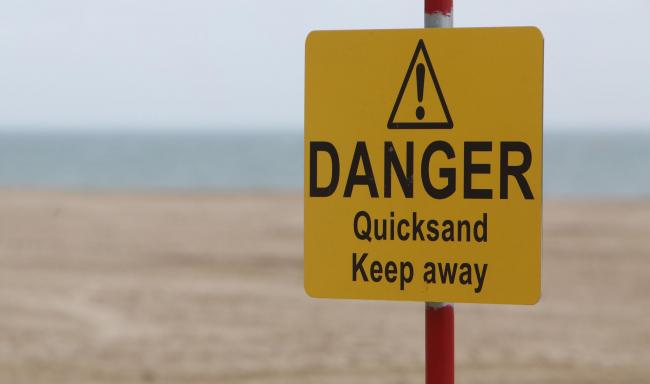We then that are strong ought to bear the infirmities of the weak, and not to please ourselves. Let every one of us please his neighbour for his good to edification. (Romans 15:1-2)
This is one of the most wonderful pieces of advice in the Bible, but it goes against our culture and some of our strongest instincts for survival. In fact, if most people really tried to put this advice into practice, they would either end up destroying themselves or giving up pretty quickly. It’s still good advice, but there’s something that has to come first.
Here is a parable that will help make the point:

Photo by Jade Grassby / @JadeDailyEcho / http://www.bournemouthecho.co.uk/author/profile/71999.Jade_Grassby/
A group of friends are out walking; suddenly they find that the ground beneath them is no longer firm. They are all slowly sinking into the earth. Some of them – the heaviest among them – are sinking faster than the others. They are friends, so the ones that are sinking the slowest try to pull the others up; but they find when they do the leverage is such that they end up pulling themselves deeper into the earth. Panic ensues, and each of them forget their ties of friendship and try to save themselves by climbing on top of the others. The one or two of them that are the truest friends offer their shoulders to the others to stand on, but their sacrifice – for they end up first to disappear – only slows their sinking friends down a bit and shows the others how futile such attitudes are. Eventually, even the one who manages to stay up the longest – by pushing his former friends down – ends up sinking into the earth.
It’s not a pretty picture, but it describes why people are often unwilling to “bear the infirmities of the weak” as a matter of course.
And yet God requires that this kind of love for our neighbors becomes automatic – just as it is automatic for Him (as is demonstrated by His Passion). When you throw in the fact that there are enemies on the sinking ground with us; nasty people who are trying to pull us under (and whom we ourselves can climb on top of with some justification); God’s expectation seems even more unrealistic. It seems to be a recipe for complete disaster!
Is it any wonder that we are so selective in helping others?
When we read that this is the kind of thing God requires of, our minds quickly rush to justify our reluctance with this objection: it is easy for God to require such behavior – He does not sink – we do!
But what if we could be like Him? What if He gave us something (someone!) firm to stand on? What if Christ’s unsinkableness was something He could share with us (e.g. Psalm 61/62:6; Matthew 7:24-27)? What if this is one of the benefits of having Him “living in us and us in Him”; of what we call the “life in Christ” (Galatians 2:20)? Wouldn’t we then be more willing to “bear the burdens of the weak”? Wouldn’t our natural desire to help people lead us to pull up everyone we could reach? Moreover, wouldn’t we want them to join us on the solid foundation that our faith has provided so that they could help rescue still more people? Wouldn’t this bring us more joy than we had when we were just trying to keep our own heads from going under?
The parable is about what happens to the ego when people live in service to others and actually put the needs of others ahead of their own: it risks annihilation. The ego has a strong desire to survive and senses that pushing others down will help keep it alive. At best, this creates a culture of pathological codependence that is incredibly unhealthy. Our egos cannot sacrifice themselves for others because they were made for the fallen world; we have to give up our egos (death to the old man! Romans 6) and accept upgraded versions – ones that are capable of instinctive trust, of confident humility, and of constant and renewable self-sacrifice.
This is what we are doing here at _________: we are learning how to stand on Christ so that we can reach out to help everyone in need. Some of us may not be there yet; our old instincts of pride and self-preservation are strong. But we are in this together, and the strong among us will help us until we ourselves are strong enough to lend a hand.
These are increasingly difficult times. Our needs and the needs of the weak around us are only going to grow. There is no policy, no vaccine, and no mandate that can meet this growing need. But Christ can, and He made us part of His Body so that we can. We can do this together in Him. No matter what the circumstances, we will never give up and we will never stop giving.
May God give us His strength so that we can carry the burdens of the weak – not for own good, but for their salvation and the furtherance of the Good News to all who find themselves on sinking sand.
